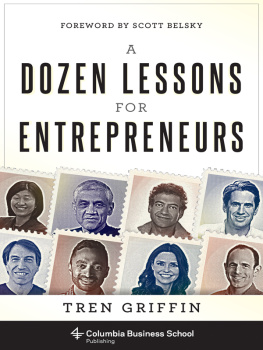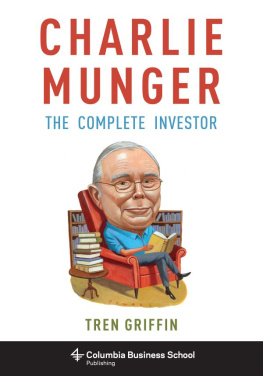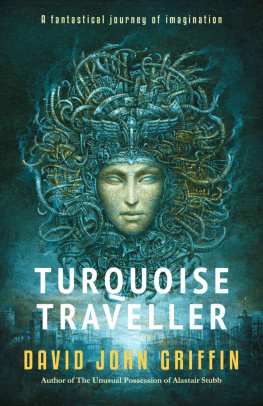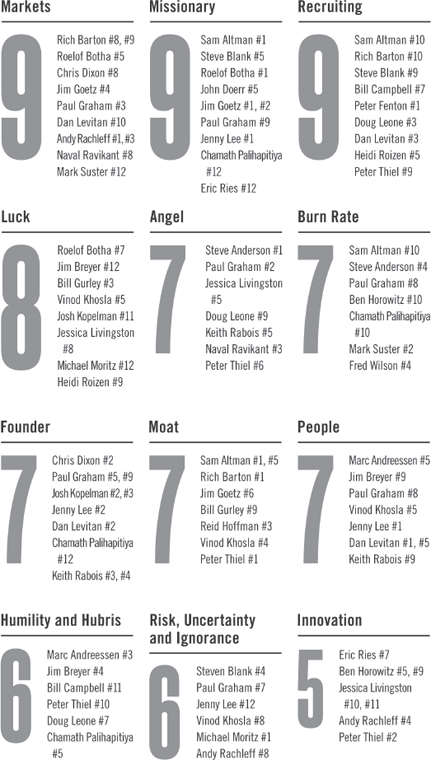Table of Contents
A Dozen Lessons for Entrepreneurs
Columbia University Press
Publishers Since 1893
New York Chichester, West Sussex
cup.columbia.edu
Copyright 2017 Columbia University Press
All rights reserved
E-ISBN 978-0-231-54569-3
Library of Congress Cataloging-in-Publication Data
Names: Griffin, Trenholme J., author.
Title: A dozen lessons for entrepreneurs / Tren Griffin.
Description: New York : Columbia University Press, [2017] | Includes index.
Identifiers: LCCN 2017025169| ISBN 9780231184823 (cloth: alk. paper) | ISBN 9780231545693 (e-book)
Subjects: LCSH: BusinesspeopleCase studies. | EntrepreneurshipCase studies. | New business enterprisesCase studies. | Success in businessCase studies.
Classification: LCC HC29 .G75 2017 | DDC 658.1/1dc23
LC record available at https://lccn.loc.gov/2017025169
A Columbia University Press E-book.
CUP would be pleased to hear about your reading experience with this e-book at .
Cover design: Fifth Letter
Contents
SCOTT BELSKY, ENTREPRENEUR, AUTHOR, AND INVESTOR
Entrepreneurship: The Discipline of Reconciling Contradictions
Entrepreneurship education is a bit of a misnomer.
How can a discipline all about creating something new have a set of best practices? The entrepreneurs we celebrate most, from across industries, did not study the past to create the future. They may have leveraged skills in business, technology, and design, but they defied conventions, ignored the experts, and shunned the status quo all along the way.
For the budding entrepreneurs among us, there is no shortage of advice. Legendary founders write books and give talks, presenting their lessons learned the hard wayneatly tied with a bow. Investors are also not shy about sharing their wisdom, garnered from years in the boardroom and the patterns they have noticed over the course of their careers. Nevertheless, all this advice is coming from highly nuanced businesses, each with its own culture, industry, and timing. Such a myriad of perspectives yield wisdom that is both valuable and contradictory. Just a few examples
We learn that experts lead industries, but we see industries transformed by neophytes.
We train to pursue industry expertise through advanced degrees and decades of experience. However, outsiders lead the boldest transformations, like Uber disrupting transportation or Airbnb disrupting hospitality. Perhaps the playbook of industry disruption requires being nave enough at the start to question basic assumptions and then staying alive long enough to employ skills that are unique and advantageous in the industry you seek to change.
We are encouraged to be original but discouraged from reinventing the wheel.
Innovation is great, as long as we do not create something unfamiliar to customers. We learn quickly that our desire to create new terminology to differentiate our products is liable to confuse customers. Like most entrepreneurs, I learned this the hard waynaming the creative fields of Behance (the online network for creative professionals I founded in 2005) realms and the groups circles, only to subsequently change their names back to the simpler fields and groups. Designing new user experiences by defying normal conventions disorients users. Over time, entrepreneurs learn that innovation helps you stand out, but familiarity helps you engage.
We celebrate leaders who ruthlessly change industries while admiring leaders who build excellent teams with humility and compassion.
I have met many founders over the years who justify their arrogance with Steve Jobs anecdotes, their reality-defying confidence by comparing themselves to Elon Musk, or their culture-first orientation by citing Howard Schultz or Tony Hsieh. However, by trying to adopt the personas of leaders we admire based on their public characterizations, we fail to acknowledge the nuances of timing, circumstances, and relationships that make all the difference. You can ask for tips, but you cannot adopt someone elses approach in aggregate. More than anything else, the journey of building a company is really the construction of your own one-of-a-kind playbook for building a team, culture, and product.
We are told to listen to our customers but are reminded that customers seldom know what they need.
While big companies conduct focus groups and market research to iterate their products, small and nimble startups launch and iterate entirely new products that kill industry incumbents. The greatest new businesses create new markets or redefine old markets in ways that customers never would have imagined. How do you listen to customers and parse their unknown needs from what they claim they want? How do you discern between cynicism and criticism to seek feedback while not being deterred by scrutiny and doubt? At some point in his or her journey, every great entrepreneur learns to gain confidence from doubt. If everyone thinks you are crazy, you are either crazy or you are really onto something. Nothing extraordinary is ever achieved through ordinary means.
We are taught to plan but advised that nothing ever goes as planned.
Every seasoned entrepreneur knows that business plans are a helpful introductory exercise but nothing more. The rational and carefully planned strategy instantly falls apart on the battlefield. Its all gut and rapid iteration as you venture into the unknown. The advice you hear from others are tactics without context. Make a plan, and edit it indefinitely.
Entrepreneurship is a business of exceptions.
Rather than selectively subscribing to whatever advice you get, perhaps the real wisdom is in the contradictions themselves. Entrepreneurship is, at its very core, a discipline of reconciling contradictionabsorbing case studies and best practices but not adopting them outright. It is an intricate balance of skill and instinct, of learning and defying.
For this reason, as an entrepreneur and investor, I have long enjoyed Trens famous Twelve Lessons posts over the years. Tren captures invaluable wisdom on entrepreneurship from every angle. Tren does not proclaim to have the right answers, nor does he subscribe to a plan for the unforeseeable. Instead, he captures and analyzes the gems from a long list of enterprising minds that break new ground in their respective fields.
















